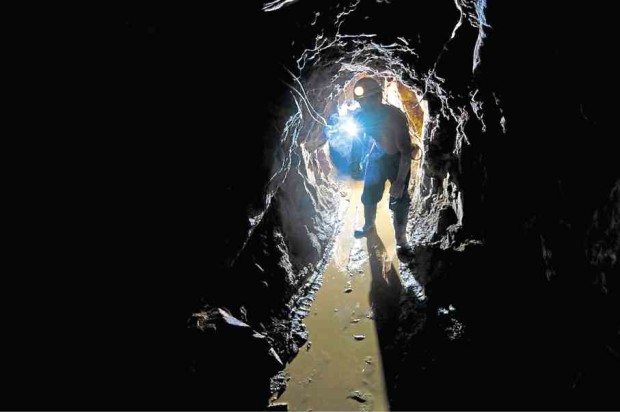
This miner in Benguet province and his family are among the hundreds of thousands of people who would suffer from the closure of 23 mines in the country. —INQUIRER FILE PHOTO
DAET, Camarines Norte—Some 11,000 families in the towns of Paracale and Panganiban have lost their primary source of income after the Mines and Geosciences Bureau (MGB) of the Department of Environment and Natural Resources (DENR) issued a cease-and-desist order (CDO) against mining activities in 12 towns of Camarines Norte province.
“The action of the director of the MGB was sudden and has displaced subsistence miners in seven villages in Panganiban town, translating to 6,000 families or about 30,000 individuals losing their livelihood,” said Sarah Marie Aviado, municipal environment and natural resources officer of Panganiban.
In the town of Paracale, 5,000 subsistence miners and their families were affected by the CDO, said Gil Salen, municipal planning and development coordinator.
Aviado considered subsistence miners to be most affected by the CDO since they earn a living on a day-to-day basis and only when they are able to mine gold.
But Guillermo Molina, MGB-Bicol director, said the CDO he issued against mining activities on Jan. 10 was based on Executive Order No. 79, and the Implementing Rules and Regulations of Republic Act No. 7076, or the Small-Scale Mining Act.
“The issuance of the CDO shows that we are doing activities not in line with the laws. I decided to enforce the CDO all over the province, especially in the towns of Paracale, Panganiban and Labo where there are illegal mining activities,” he said.
Molina said he enforced the CDO against illegal mining activities in Camarines Norte because no one has been given permit for small-scale mining in the absence of “Minahang Bayan,” a specific mineralized area in a locality where small-scale mining is permitted by the DENR secretary based on the recommendation of the Provincial/City Mining Regulatory Board.
He said the DENR has approved only seven Minahang Bayan so far since the Small-Scale Mining Act was approved in 1991 in the entire country.
Molina said that with Camarines Norte, there has been a lack of consent from large-scale mining corporations to allow a Minahang Bayan inside their claims, which barred approval of its application.
Serafin Dasco, president of the Samahan ng Magkakabod ng Paracale (Association of Subsistence Miners in Paracale), said that if the problem was the consent from mineral claimants, there must be a prescription of the mineral claims once it is idle for a long period.
Molina said there is a five-year prescription after which the MGB can recommend the cancellation of the mineral claims.
Wilfredo Sapalaran, 54, subsistence miner, said he raised his brood of seven children solely from mining which he started in 1980 in Barangay Luklukan in Panganiban town.
“I call on the government to allow us [to] continue our mining activities because we do not destroy the environment unlike the large-scale mining that strips mountains of vegetation,” he said.
Maria Linda Yasis, 46, said the primary livelihood of her family was through subsistence mining.
She said that if the government continued to prevent them from mining, it would be tantamount to “burying their family in the grave.”
Gov. Edgardo A. Tallado sympathized with the subsistence miners who have lost their livelihood since the CDO was enforced by the MGB without giving them alternative livelihood.
“There were pending applications for small-scale mining but the MGB won’t give them permits,” Tallado said.